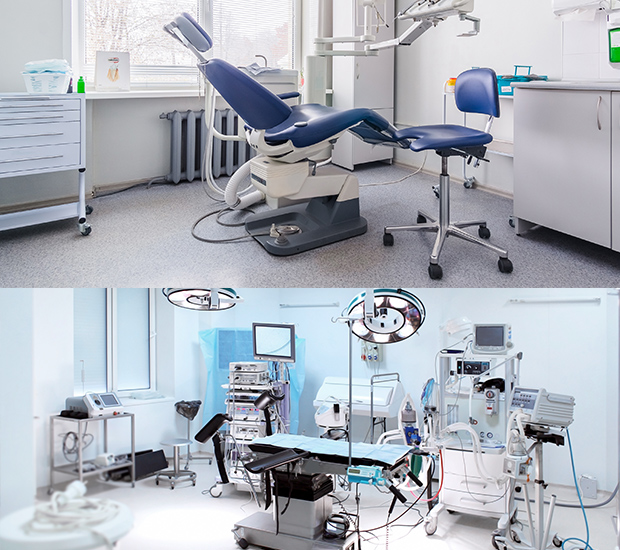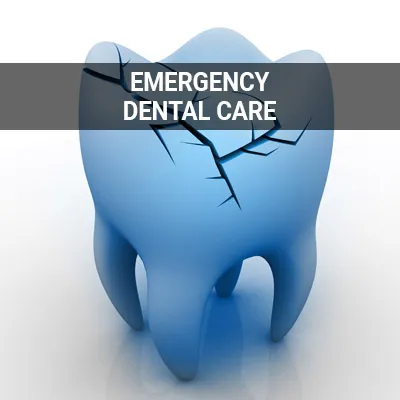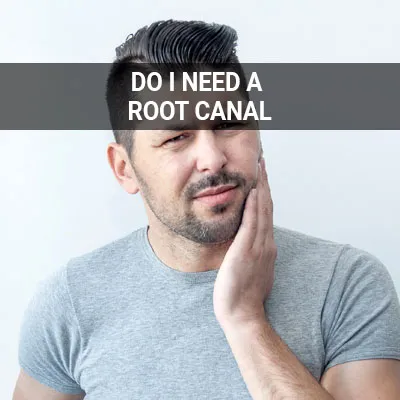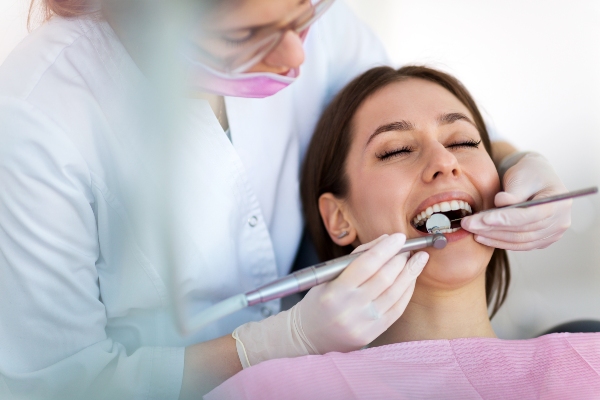Emergency Dentist vs. Emergency Room Alpharetta, GA
If you experience a dental emergency, it is important to know an emergency dentist is just a phone call away. Many dentists who provide emergency services make themselves available 24 hours a day, as emergencies can arise at any time. Emergency dentists are professionals who treat walk-in and last-minute patients who require immediate care.
Emergency dental care is available at Windward Parkway Dentistry in Alpharetta and the surrounding area. In the case of a dental emergency, you should ideally contact our office first. However, there may be times — such as when an issue arises at night, over the weekend, or on a holiday — when your first instinct is to rush to the emergency room. In these situations, carefully consider the severity of the problem and whether it necessitates ER care.
Dental emergencies can arise at any time of day or night, and in a variety of situations. When one does, call Windward Parkway Dentistry at (770) 814-6224 to get the immediate treatment you need.
When To Go Straight to the ER
Per the American Dental Association, the number of dental-related ER visits nearly doubled, from 1.1 million to 2.1 million, between 2000 and 2010. Despite the increase in numbers, there are actually very few dental-related concerns for which patients should head immediately to their hospital's ER department.
When a Patient Experiences Trauma to the Face
If a blow to the face or accident results in chipped, cracked, or lost teeth, an emergency dentist should be equipped to handle the situation. However, when the accident or incident causes extensive facial trauma, such as broken bones, puncture wounds, lacerations, or damage to the soft tissues, it may be a good idea for the injured party to seek medical care before emergency dental care. Emergency dentists may have the capacity to restore oral health, but most cannot set broken bones, sew up lacerations, or perform other extensive medical procedures.
When an Emergency Dentist Is Unavailable
If someone experiences a dental emergency aside from those mentioned above, and if an emergency dentist is not immediately available to handle it, then the patient should head to the hospital. Though ER personnel may not be able to treat the underlying condition, they can help the patient manage the pain and other symptoms until an emergency dentist becomes available.
“There are actually very few dental-related concerns for which patients should head immediately to their hospital’s ER department.”
Emergency Dental Appointments
If an emergency occurs during business hours, call the dental office for advice. Dental emergencies include:
- Broken, cracked, or chipped teeth
- Dental pain
- Jaw injuries
- Knocked-out teeth
- Loose permanent teeth
- Oral bleeding
The office team can provide on-the-spot guidance. They can also arrange a same-day or next-day appointment. After an emergency, the team may ask the patient to visit the office as soon as possible.
Sometimes, patients might be tempted to delay their appointment. For example, they may be nervous about seeing a dentist or reluctant to reschedule an important meeting. But keep in mind that dental emergencies can worsen rapidly.
The human mouth is home to hundreds of species of bacteria. After an oral injury, bacteria can enter the bloodstream. They may travel to internal organs and cause life-threatening complications. Emergency treatment helps prevent or treat serious oral infections.
Untreated dental emergencies can also result in permanent tooth loss. Patients who delay treatment may need extensive reconstructive work. Prompt treatment resolves dental problems and protects your oral health. If you have a dental emergency, do not wait to seek care.
“What happens if I do not seek care after a dental emergency?”
Understanding Emergency Dental Treatment
During an emergency visit, the dental team may take photos or X-rays. Next, the dentist performs a thorough exam. First, they inspect the patient's teeth and gums. Then the dentist determines what treatment is necessary.
If the patient has severe health problems, the dentist may arrange for an ambulance or send the patient to the ER. Hospital visits are usually reserved for severe injuries like broken bones or widespread infections. In most cases, the dentist can resolve the problem in the office.
The dentist can repair broken teeth or damaged dental appliances. But sometimes, treatment may involve several office visits. For example, if the patient needs a crown or implant, the dentists may order materials from a lab. The dental team might also delay reconstructive work until the patient's mouth has healed from the original injury. Our team can let you know how many procedures to expect.
Dentists can treat oral injuries with stitches or medication. Prescription drugs can also treat or prevent infection. If the patient has an abscessed tooth or gum, they may need a combination of medication and in-office care. Abscesses occur when a pocket of pus develops near the root of the tooth. These bacterial infections can cause debilitating pain. Patients experiencing an abscess may need in-depth care.
“What happens during an emergency dental visit?”
Check out what others are saying about our dental services on Yelp: Emergency Dentist vs. Emergency Room in Alpharetta, GA
Oral Infections
If the patient has an abscess, the dentist must remove the source of the infection. Often, the dentist will perform a root canal. During these procedures, the dentist drills into the tooth and drains the pus. The dentist may also need to pull the tooth the clear the infection. Afterward, patients receive antibiotics to help clear up the infection.
Some patients may try to "wait out" their symptoms, but oral infections seldom clear up on their own. Instead, infections usually worsen and spread to other body parts. Untreated infections can result in life-threatening health problems.
Seek treatment right away if you experience any of the following symptoms:
- Chills
- Difficulty swallowing
- Fever
- Foul taste in the mouth
- Inflamed lymph nodes
- Severe oral pain
- Swollen cheeks or jaw
“Untreated infections can result in life-threatening health problems.”
Questions Answered on This Page
Q. When should I go straight to the emergency room?
Q. What happens if I do not seek care after a dental emergency?
Q. What happens during an emergency dental visit?
Q. How are oral infections treated?
Q. What kind of follow-up care will I receive?
People Also Ask
Q. What steps should happen after chipping a tooth?
Q. Are pain and tenderness when touching the teeth or chewing a sign of a problem?
Q. What are the symptoms of a cracked tooth?
Q. What are some of the signs indicating a need for tooth extraction?
Follow-Up Care
After a dental emergency, patients can expect at least one follow-up visit. During this checkup, the dentist examines the patient's mouth. They may ask about the patient's symptoms and pain level. Sometimes, the dentist also performs an X-ray. Follow-up visits ensure that treatment was successful. If the patient needs further care, the dentist can adjust their treatment plan.
Some dental emergencies can take time to resolve. For example, a dentist may perform several procedures to repair damage caused by a severe injury or accident. If the emergency resulted in tooth loss, it might also take time to arrange for a replacement tooth. The dentist can provide further details about your treatment timeline.
“After a dental emergency, patients can expect at least one follow-up visit.”
Frequently Asked Questions
Q. What is a dental emergency?
A. Dental emergencies may involve severe pain, heavy oral bleeding, or tooth damage. Sometimes, patients find it hard to determine whether they are experiencing an emergency. When in doubt, reach out to an emergency dentist or doctor for guidance. Always seek care for sudden or worsening tooth pain.
Q. What should I do if I need emergency dental care?
A. If you experience a dental emergency, call your dentist. The office team can determine whether you need to visit the ER. If the dentist can handle the problem in-office, the team can arrange a same-day appointment.
Q. What should I do if I cannot reach my dentist during a dental emergency?
A. If an emergency happens during evenings, weekends, or holidays, go straight to the ER. Do not wait until your dental office reopens. Delaying emergency dental care may result in life-threatening health complications or permanent tooth damage.
Q. What dental emergencies always require an ER visit?
A. Dental emergencies may occur after a head injury. If you suffer a blow to the head, visit the ER for a full exam. Head injuries may seem minor at first, but they can trigger internal bleeding or brain inflammation. See a doctor for a complete screening. Then contact your emergency dentist after you leave the hospital.
Q. What should I do if I have injured my gums, cheeks, or tongue?
A. First, stop the bleeding immediately. You may do so by applying light pressure to the injury site with a cold compress. Then, contact us right away.
Dental Emergency Terminology
Call Windward Parkway Dentistry in the Event of an Emergency
Dental emergencies can happen at any time. Know you can rely on our team when they do. Call (770) 814-6224 for the immediate care you need when one does.
Helpful Related Links
- American Dental Association (ADA). Glossary of Dental Clinical Terms. 2024
- American Academy of Cosmetic Dentistry® (AACD). Home Page. 2024
- WebMD. WebMD’s Oral Care Guide. 2024
About our business and website security
- We accept the following payment methods: Cash, Check, Discover, MasterCard, and Visa
- We serve patients from the following counties: Fulton County
- We serve patients from the following cities: Alpharetta, Bethany Crossing, Herring Township, and Milton
- Norton Safe Web. View Details
- Trend Micro Site Safety Center. View Details
Back to top of Emergency Dentist vs. Emergency Room











